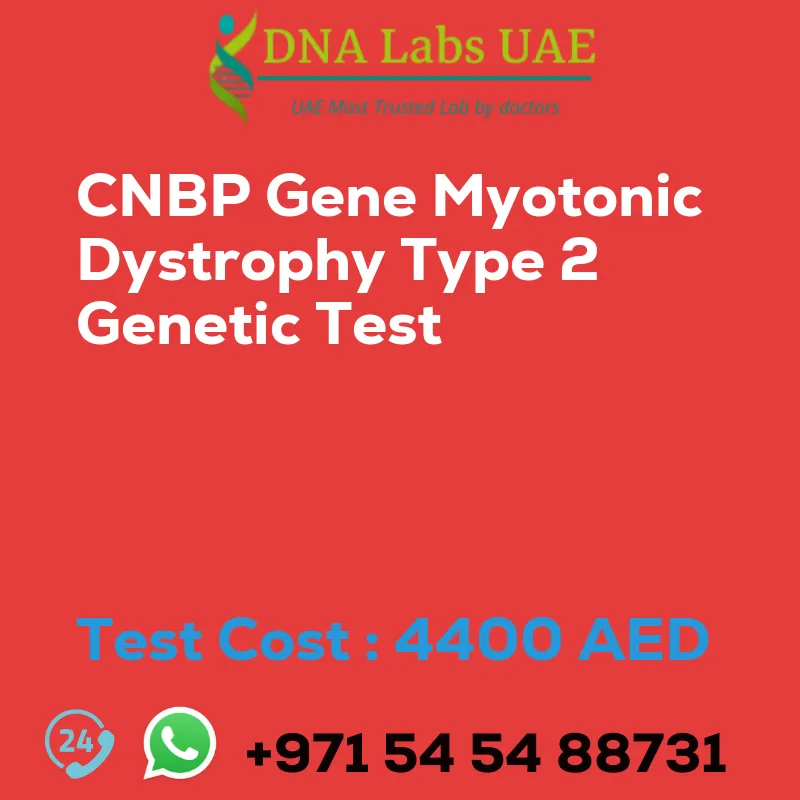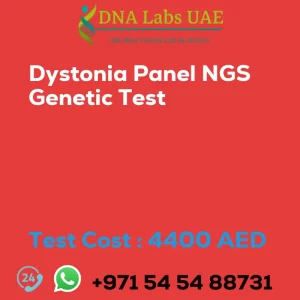CNBP Gene Myotonic Dystrophy Type 2 Genetic Test
At DNA Labs UAE, we offer the CNBP Gene Myotonic Dystrophy Type 2 Genetic Test for individuals who suspect they may have this genetic disorder. This test can provide valuable information about the presence and severity of myotonic dystrophy type 2, helping patients and their healthcare providers make informed decisions about treatment and management.
Test Components and Price
The CNBP Gene Myotonic Dystrophy Type 2 Genetic Test is priced at 4400.0 AED. The test requires a blood sample, extracted DNA, or one drop of blood on an FTA card.
Report Delivery
Once the sample is received, the report will be delivered within 3 to 4 weeks.
Testing Method
The CNBP Gene Myotonic Dystrophy Type 2 Genetic Test utilizes Next-Generation Sequencing (NGS) technology. NGS allows for the simultaneous analysis of multiple genes, providing a more comprehensive analysis of the CNBP gene compared to traditional methods like Sanger sequencing.
Test Type and Doctor
The CNBP Gene Myotonic Dystrophy Type 2 Genetic Test falls under the category of Neurological Disorders. The test is conducted by a Neurologist in our Genetics department.
Pre-Test Information
Prior to the test, it is essential to provide the clinical history of the patient who is undergoing the CNBP Gene Myotonic Dystrophy Type 2 NGS Genetic DNA Test. Additionally, a genetic counseling session will be conducted to draw a pedigree chart of family members affected by CNBP Gene Myotonic Dystrophy Type 2.
Test Details
The CNBP gene codes for the protein CCHC-type zinc finger nucleic acid binding protein. Myotonic dystrophy type 2 (DM2) is a genetic disorder caused by an expansion of the CCTG repeat in the CNBP gene.
NGS genetic testing is a highly advanced method that can detect and analyze the CCTG repeat expansion in the CNBP gene, providing a comprehensive analysis of the gene. This type of testing can also identify other genetic variants or mutations associated with the development or progression of myotonic dystrophy type 2.
During the test, a DNA sample is obtained from a blood sample or cheek swab. The DNA is then sequenced using NGS technology, and the resulting data is analyzed to identify any abnormalities or variations in the CNBP gene.
The results of the NGS genetic test are crucial for confirming a diagnosis of myotonic dystrophy type 2 and providing information about the size of the CCTG repeat expansion in the CNBP gene. This information is vital for genetic counseling and guiding treatment and management decisions for individuals with myotonic dystrophy type 2.
Choose DNA Labs UAE for accurate and reliable CNBP Gene Myotonic Dystrophy Type 2 Genetic Testing. Our team of experts is committed to providing comprehensive genetic testing services to help individuals and their healthcare providers make informed decisions about their health.
| Test Name | CNBP Gene Myotonic dystrophy type 2 Genetic Test |
|---|---|
| Components | |
| Price | 4400.0 AED |
| Sample Condition | Blood or Extracted DNA or One drop Blood on FTA Card o |
| Report Delivery | 3 to 4 Weeks |
| Method | NGS Technology |
| Test type | Neurological Disorders |
| Doctor | Neurologist |
| Test Department: | Genetics |
| Pre Test Information | Clinical History of Patient who is going for CNBP Gene Myotonic dystrophy type 2 NGS Genetic DNA Test A Genetic Counselling session to draw a pedigree chart of family members affected with CNBP Gene Myotonic dystrophy type 2 |
| Test Details |
The CNBP gene is a gene that codes for the protein CCHC-type zinc finger nucleic acid binding protein. Myotonic dystrophy type 2 (DM2) is a genetic disorder that is caused by an expansion of the CCTG repeat in the CNBP gene. NGS (Next-Generation Sequencing) genetic testing is a type of genetic testing that uses high-throughput sequencing technologies to analyze multiple genes simultaneously. In the context of myotonic dystrophy type 2, NGS genetic testing can be used to detect and analyze the CCTG repeat expansion in the CNBP gene. This type of genetic testing can provide a more comprehensive analysis of the CNBP gene compared to traditional methods, such as Sanger sequencing. It can also potentially detect other genetic variants or mutations that may be associated with the development or progression of myotonic dystrophy type 2. NGS genetic testing for myotonic dystrophy type 2 can be performed using a sample of DNA, typically obtained from a blood sample or cheek swab. The DNA is sequenced using NGS technology, and the resulting data is analyzed to identify any abnormalities or variations in the CNBP gene. The results of the NGS genetic test can help confirm a diagnosis of myotonic dystrophy type 2 and provide information about the size of the CCTG repeat expansion in the CNBP gene. This information can be important for genetic counseling, as well as for guiding treatment and management decisions for individuals with myotonic dystrophy type 2. |








